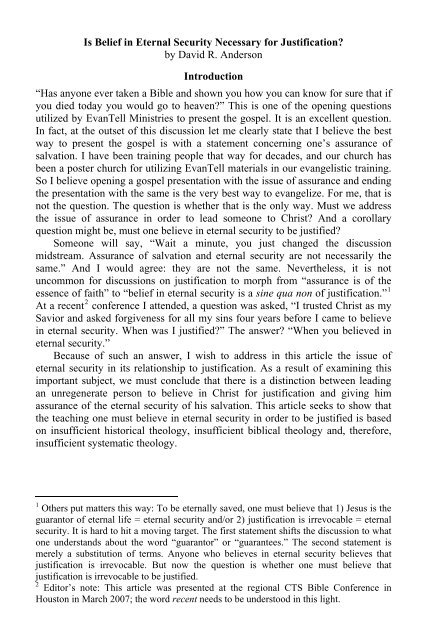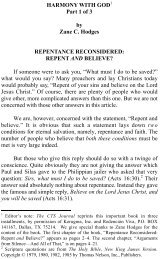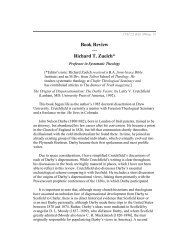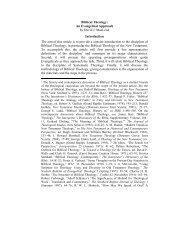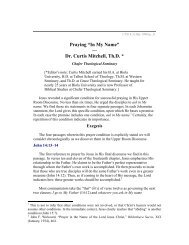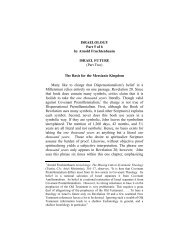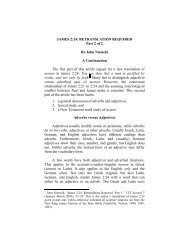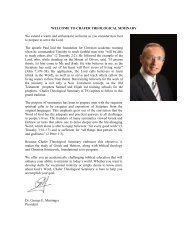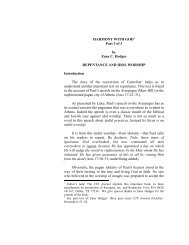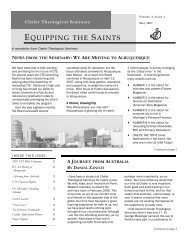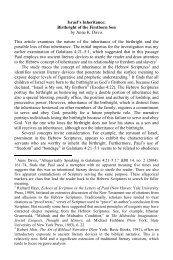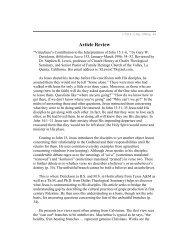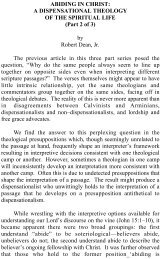Is Belief in Eternal Security Necessary for Justification? - Chafer ...
Is Belief in Eternal Security Necessary for Justification? - Chafer ...
Is Belief in Eternal Security Necessary for Justification? - Chafer ...
You also want an ePaper? Increase the reach of your titles
YUMPU automatically turns print PDFs into web optimized ePapers that Google loves.
<strong>Is</strong> <strong>Belief</strong> <strong>in</strong> <strong>Eternal</strong> <strong>Security</strong> <strong>Necessary</strong> <strong>for</strong> <strong>Justification</strong>?<br />
by David R. Anderson<br />
Introduction<br />
“Has anyone ever taken a Bible and shown you how you can know <strong>for</strong> sure that if<br />
you died today you would go to heaven?” This is one of the open<strong>in</strong>g questions<br />
utilized by EvanTell M<strong>in</strong>istries to present the gospel. It is an excellent question.<br />
In fact, at the outset of this discussion let me clearly state that I believe the best<br />
way to present the gospel is with a statement concern<strong>in</strong>g one’s assurance of<br />
salvation. I have been tra<strong>in</strong><strong>in</strong>g people that way <strong>for</strong> decades, and our church has<br />
been a poster church <strong>for</strong> utiliz<strong>in</strong>g EvanTell materials <strong>in</strong> our evangelistic tra<strong>in</strong><strong>in</strong>g.<br />
So I believe open<strong>in</strong>g a gospel presentation with the issue of assurance and end<strong>in</strong>g<br />
the presentation with the same is the very best way to evangelize. For me, that is<br />
not the question. The question is whether that is the only way. Must we address<br />
the issue of assurance <strong>in</strong> order to lead someone to Christ? And a corollary<br />
question might be, must one believe <strong>in</strong> eternal security to be justified?<br />
Someone will say, “Wait a m<strong>in</strong>ute, you just changed the discussion<br />
midstream. Assurance of salvation and eternal security are not necessarily the<br />
same.” And I would agree: they are not the same. Nevertheless, it is not<br />
uncommon <strong>for</strong> discussions on justification to morph from “assurance is of the<br />
essence of faith” to “belief <strong>in</strong> eternal security is a s<strong>in</strong>e qua non of justification.” 1<br />
At a recent 2 conference I attended, a question was asked, “I trusted Christ as my<br />
Savior and asked <strong>for</strong>giveness <strong>for</strong> all my s<strong>in</strong>s four years be<strong>for</strong>e I came to believe<br />
<strong>in</strong> eternal security. When was I justified?” The answer? “When you believed <strong>in</strong><br />
eternal security.”<br />
Because of such an answer, I wish to address <strong>in</strong> this article the issue of<br />
eternal security <strong>in</strong> its relationship to justification. As a result of exam<strong>in</strong><strong>in</strong>g this<br />
important subject, we must conclude that there is a dist<strong>in</strong>ction between lead<strong>in</strong>g<br />
an unregenerate person to believe <strong>in</strong> Christ <strong>for</strong> justification and giv<strong>in</strong>g him<br />
assurance of the eternal security of his salvation. This article seeks to show that<br />
the teach<strong>in</strong>g one must believe <strong>in</strong> eternal security <strong>in</strong> order to be justified is based<br />
on <strong>in</strong>sufficient historical theology, <strong>in</strong>sufficient biblical theology and, there<strong>for</strong>e,<br />
<strong>in</strong>sufficient systematic theology.<br />
1 Others put matters this way: To be eternally saved, one must believe that 1) Jesus is the<br />
guarantor of eternal life = eternal security and/or 2) justification is irrevocable = eternal<br />
security. It is hard to hit a mov<strong>in</strong>g target. The first statement shifts the discussion to what<br />
one understands about the word “guarantor” or “guarantees.” The second statement is<br />
merely a substitution of terms. Anyone who believes <strong>in</strong> eternal security believes that<br />
justification is irrevocable. But now the question is whether one must believe that<br />
justification is irrevocable to be justified.<br />
2 Editor’s note: This article was presented at the regional CTS Bible Conference <strong>in</strong><br />
Houston <strong>in</strong> March 2007; the word recent needs to be understood <strong>in</strong> this light.
48 CTS Journal 13 (Spr<strong>in</strong>g 2008)<br />
Insufficient Historical Theology<br />
The real issue <strong>in</strong> eternal security is what happens to our s<strong>in</strong>s after we have trusted<br />
<strong>in</strong> Christ as savior. It seems that the postapostolic church saw water baptism as<br />
the laver of regeneration that covered all s<strong>in</strong>s lead<strong>in</strong>g up to water baptism.<br />
Postbaptismal s<strong>in</strong>s were another question. They were to be handled by<br />
confession, contrition, and penance. Improper deal<strong>in</strong>g with postbaptismal s<strong>in</strong>s led<br />
to loss of salvation.<br />
Thomas F. Torrance wrote a dissertation <strong>for</strong> Basel entitled “The Doctr<strong>in</strong>e of<br />
Grace <strong>in</strong> the Apostolic Fathers.” It was his claim that the doctr<strong>in</strong>e of grace was<br />
lost after the apostles, not to be reclaimed until the Re<strong>for</strong>mation. Although he<br />
tends to lump all the apostolic fathers together and makes too many<br />
generalizations, a case could be made that none of the Fathers promoted the<br />
doctr<strong>in</strong>es of eternal security or assurance of salvation. Au contraire, most of them<br />
taught aga<strong>in</strong>st these doctr<strong>in</strong>es<br />
Second Clement, <strong>for</strong> example, tells us that if we do not keep our baptism pure<br />
and undefiled, we will not enter the k<strong>in</strong>gdom of God 3 and that salvation “<strong>in</strong> the<br />
end” comes only to those who practice righteousness. 4 The Epistle to Barnabas<br />
tells us that we are “hop<strong>in</strong>g to be saved.” 5 No one can take the attitude that he is<br />
“already justified.” 6 If faith makes one a new creature, works keep one <strong>in</strong> the<br />
k<strong>in</strong>gdom: “Each person will receive accord<strong>in</strong>g to what he has done: if he is good,<br />
his righteousness will precede him; if he is evil, the wages of do<strong>in</strong>g evil will go<br />
be<strong>for</strong>e him. Let us never fall asleep <strong>in</strong> our s<strong>in</strong>s, as if be<strong>in</strong>g ‘called’ was an excuse<br />
to rest, lest the evil ruler ga<strong>in</strong> power over us and thrust us out of the k<strong>in</strong>gdom of<br />
the Lord.” 7<br />
As we work our way through the church fathers to August<strong>in</strong>e, noth<strong>in</strong>g<br />
changes with regard to their view of postbaptismal s<strong>in</strong>s, and August<strong>in</strong>e does<br />
noth<strong>in</strong>g to clear the murky waters. Of course, he never taught eternal security or<br />
assurance of one’s salvation <strong>in</strong> this life and viewed justification, not as a change<br />
of one’s stand<strong>in</strong>g be<strong>for</strong>e God (<strong>for</strong>ensic), but as a progressive change of one’s<br />
condition on earth. The elect would not be identified until physical death.<br />
August<strong>in</strong>e became the summa pater of Western Christianity. His teach<strong>in</strong>gs, after<br />
some <strong>in</strong>itial resistance, won the day <strong>in</strong> the West and were not contradicted until<br />
the Re<strong>for</strong>mation. It was the Re<strong>for</strong>mers who <strong>in</strong>troduced the concept of all s<strong>in</strong>s<br />
(past, present, and future) be<strong>in</strong>g dealt with at the cross, mean<strong>in</strong>g at the time of<br />
<strong>in</strong>itial faith <strong>in</strong> Christ. And even this <strong>for</strong>ensic understand<strong>in</strong>g of justification did<br />
not come all at once. In 1516, Luther first understood the righteousness of Christ<br />
as someth<strong>in</strong>g external to the believer. It was not until ten or more years later that<br />
Melanchthon developed the <strong>for</strong>ensic view of a declaration of righteousness<br />
pronounced <strong>in</strong> the courtroom of heaven. As Alister McGrath po<strong>in</strong>ts out:<br />
3 2 Clement 6.9.<br />
4 Ibid., 19.3.<br />
5 Epistle to Barnabas 1.3.<br />
6 Ibid., 4.10.<br />
7 Ibid., 4.12, 13.
<strong>Is</strong> <strong>Belief</strong> <strong>Eternal</strong> <strong>Security</strong> <strong>Necessary</strong> <strong>for</strong> <strong>Justification</strong>? 49<br />
In his earlier phase, around the years 1515–19, Luther tended to<br />
understand justification as a process of becom<strong>in</strong>g, <strong>in</strong> which the s<strong>in</strong>ner<br />
was gradually con<strong>for</strong>med to the likeness of Jesus Christ through a<br />
process of <strong>in</strong>ternal renewal. In his later writ<strong>in</strong>gs, however, dat<strong>in</strong>g<br />
from the mid-1530s and beyond, perhaps under the <strong>in</strong>fluence of<br />
Melanchthon’s more <strong>for</strong>ensic approach to justification, Luther tended<br />
to treat justification as a matter of be<strong>in</strong>g declared to be righteous,<br />
rather than a process of becom<strong>in</strong>g righteous. Increas<strong>in</strong>gly, he came to<br />
see justification as an event, which was complemented by the dist<strong>in</strong>ct<br />
process of regeneration and <strong>in</strong>terior renewal through the action of the<br />
Holy Spirit. <strong>Justification</strong> alters the outer status of the s<strong>in</strong>ner <strong>in</strong> the<br />
sight of God (coram Deo), while regeneration alters the s<strong>in</strong>ner’s <strong>in</strong>ner<br />
nature. 8<br />
After the Apostle Paul, the Re<strong>for</strong>mers were pioneers <strong>in</strong> this concept of<br />
<strong>for</strong>giveness of future s<strong>in</strong>s—an absolute necessity if one is to believe <strong>in</strong> eternal<br />
security. And it dawned on them rather slowly. But here is the po<strong>in</strong>t. If God is<br />
build<strong>in</strong>g His church and the gates of hell cannot prevail aga<strong>in</strong>st it, then there had<br />
to be a witness from A.D. 100 to A.D. 1500. In other words, there had to be<br />
genu<strong>in</strong>e born-aga<strong>in</strong> people liv<strong>in</strong>g throughout this era. But we have no written<br />
record of anyone teach<strong>in</strong>g <strong>for</strong>giveness of postbaptismal s<strong>in</strong>s once and <strong>for</strong> all at<br />
the po<strong>in</strong>t of faith <strong>in</strong> Christ. Hence, no-one taught eternal security or assurance of<br />
salvation.<br />
If either or even both of these doctr<strong>in</strong>es were required <strong>for</strong> justification, then<br />
we could say that none of the writers dur<strong>in</strong>g these centuries between the apostles<br />
and the Re<strong>for</strong>mation was justified. One might claim that born-aga<strong>in</strong> people<br />
existed dur<strong>in</strong>g these centuries, but they did not leave anyth<strong>in</strong>g <strong>in</strong> writ<strong>in</strong>g. This is<br />
an argument from silence. Yet God cont<strong>in</strong>ued to build His church, and that<br />
organism is comprised of only people baptized by the Holy Spirit (1 Cor<strong>in</strong>thians<br />
12:13), that is, born-aga<strong>in</strong> people. But did any of them believe <strong>in</strong> eternal security<br />
or assurance of salvation? Perhaps so, but there is no written record of which I<br />
am aware. To say that the born-aga<strong>in</strong> people dur<strong>in</strong>g this era had assurance at the<br />
moment of regenerat<strong>in</strong>g faith but lost it later because of bad teach<strong>in</strong>g is another<br />
argument from silence. So, unless Christ built His church on an organization of<br />
unbelievers, I would conclude that the teach<strong>in</strong>g that belief <strong>in</strong> eternal security is a<br />
requirement <strong>for</strong> justification is based on <strong>in</strong>sufficient historical theology. The<br />
church flourished. Yet there is no record of anyone who believed <strong>in</strong> eternal<br />
security or had assurance of his salvation. Are we really ready to say that all the<br />
people of whom we have a written record between the apostles and the<br />
Re<strong>for</strong>mers went to hell? The historical theology which would claim such is<br />
<strong>in</strong>sufficient, and so is the biblical theology beh<strong>in</strong>d this position.<br />
8 Alister E. McGrath, Christian Theology (Malden, MA: Blackwell, 1994), 444.
50 CTS Journal 13 (Spr<strong>in</strong>g 2008)<br />
Insufficient Biblical Theology<br />
The argument that one must believe <strong>in</strong> eternal security or some guarantee of<br />
eternal life that can never be lost is based on a number of assumptions:<br />
• John is the only New Testament book written to unbelievers. Hence, it is<br />
the last word <strong>in</strong> matters of evangelism.<br />
• The authorial <strong>in</strong>tent of John is evangelism.<br />
• <strong>Eternal</strong> life equals eternal security.<br />
• Other New Testament books are written to believers <strong>for</strong> the purpose of<br />
edification. Hence, anyth<strong>in</strong>g they say regard<strong>in</strong>g the gospel assumes a<br />
preunderstand<strong>in</strong>g of gospel truth that does not need to be spelled out <strong>in</strong><br />
complete <strong>for</strong>m.<br />
I would like to challenge these assumptions one by one.<br />
John <strong>Is</strong> the Only New Testament Book Written to Unbelievers<br />
This may or may not be true. It cannot be proven. For example, one third of the<br />
New Testament was written to Theophilus. The consensus of scholarship is that<br />
Theophilus was a Gentile God-fearer who was drawn to Judaism but felt out of<br />
place <strong>in</strong> the all-Jewish community. Christianity—this new brand of Judaism—<br />
was his answer. It is not at all a proven fact that Luke-Acts was written to<br />
believers. As Donald Nolan suggests:<br />
Indeed, I thought then, and th<strong>in</strong>k now, that the ideal first-century reader<br />
<strong>for</strong> much of the Gospel of Luke (and of Acts) is a God-fearer; one whose<br />
birth is not Jewish and whose background culture is Hellenistic, but who<br />
had been attracted to Judaism, drawn to the God of <strong>Is</strong>rael . . . . Such a<br />
God-fearer would have experienced the ambiguity of his situation <strong>in</strong><br />
Judaism: welcomed, but at the crucial divide still considered to be an<br />
outsider to the promises of God. . . . now he stands at the crossroads. On<br />
the one hand Christianity is be<strong>in</strong>g offered to him as the completion and<br />
fulfillment of the Judaism to which he has been drawn, . . . On the other<br />
hand there are his Jewish friends . . . who urge our God-fearer to make<br />
the break and to abandon his Gentile identity once and <strong>for</strong> all and to<br />
come all the way <strong>in</strong>to Judaism, to become a Jew. 9<br />
Darrell Bock <strong>in</strong> his commentary on Luke makes a similar statement when he<br />
says, “It is debated whether Theophilus is already a Christian or is th<strong>in</strong>k<strong>in</strong>g of<br />
becom<strong>in</strong>g one. Theophilus appears to be a man of rank (Luke 1:3) who has<br />
associated himself with the church, but doubts whether <strong>in</strong> fact he really belongs<br />
<strong>in</strong> this racially mixed and heavily persecuted community.” 10<br />
9 John Nollan, “Introduction,” <strong>in</strong> Luke 1–9:20, vol. 35A of WBC (Dallas: Word, 1989).<br />
10 Darrell Bock, Luke 1:1–9:50, Baker Exegetical Commentary on the New Testament,<br />
ed. Moisés Silva (Grand Rapids: Baker, 1994), 14–15.
<strong>Is</strong> <strong>Belief</strong> <strong>Eternal</strong> <strong>Security</strong> <strong>Necessary</strong> <strong>for</strong> <strong>Justification</strong>? 51<br />
Thus, it is tenuous at best to declare categorically that the Gospel of John is<br />
the only New Testament book written <strong>for</strong> unbelievers and there<strong>for</strong>e the f<strong>in</strong>al<br />
word <strong>in</strong> the New Testament on evangelism.<br />
The Authorial Intent of John <strong>Is</strong> Evangelism<br />
And what about John? How do we even know it was written to unbelievers? Who<br />
were they? Did they reside <strong>in</strong> Rome or somewhere <strong>in</strong> Turkey? Was this a long<br />
gospel tract passed out to unbelievers as they entered the Coliseum? If there was<br />
no pr<strong>in</strong>t<strong>in</strong>g press to produce thousands of <strong>in</strong>dividual tracts, how did they get the<br />
unbelievers together to hear the Gospel of John read?<br />
Aga<strong>in</strong>, we have unproven assumptions. The usual evidence marshaled to<br />
prove that John was written to unbelievers comes from John 20:31: “But these<br />
are written that you may believe that Jesus is the Christ, the Son of God, and that<br />
believ<strong>in</strong>g you may have life <strong>in</strong> His name.” It is expla<strong>in</strong>ed that we have gotten to<br />
the end of the Gospel of John, and the purpose statement is given. But if that is<br />
true <strong>for</strong> John, it should be true of 1 John 5:13, “I write these th<strong>in</strong>gs to you who<br />
believe <strong>in</strong> the name of the Son of God so that you may know that you have<br />
eternal life.” Both verses come at the end of their respective books; both use<br />
tauta <strong>for</strong> “these” or “these th<strong>in</strong>gs”; both use the verb graphō. If John 20:31 is the<br />
purpose statement of John, then 1 John 5:13 should be the purpose statement of 1<br />
John. After all, they were written by the same author. But people <strong>in</strong> the Free<br />
Grace movement do not want to claim 1 John 5:13 as the purpose statement of 1<br />
John, s<strong>in</strong>ce that would make it a book about the tests of life—exactly what is<br />
claimed by those who hold to perseverance theology.<br />
In order to avoid read<strong>in</strong>g 1 John 5:13 as the purpose statement of 1 John, the<br />
argument is made that tauta (“these th<strong>in</strong>gs”) is a reference to what immediately<br />
precedes, and the purpose statement of the book is exactly where one would<br />
expect to f<strong>in</strong>d it—at the beg<strong>in</strong>n<strong>in</strong>g (1 John 1:3-4). It is a book about fellowship,<br />
not assurance. But if that is sound argumentation <strong>for</strong> 1 John, it should be sound<br />
<strong>for</strong> the Gospel as well. Tauta (“these”) of John 20:31 refers back to the eight<br />
signs John has chosen to write about <strong>in</strong> his Gospel and referenced <strong>in</strong> John 20:30.<br />
And these eight signs were written <strong>in</strong> order to persuade unbelievers to believe.<br />
But the material conta<strong>in</strong><strong>in</strong>g the eight signs hardly comprises the entire book.<br />
There is a large section written about Jesus’ <strong>in</strong>teraction and revelation of <strong>in</strong>timate<br />
truth <strong>for</strong> believers (the Upper Room Discourse, John 13–17). In that section of<br />
John the unbeliever (Judas) is sent out because that which was to be shared was<br />
not <strong>for</strong> him. Why <strong>in</strong>clude this section <strong>in</strong> a book written to unbelievers?<br />
Now the Upper Room Discourse could be expla<strong>in</strong>ed either as a leitmotif <strong>in</strong><br />
John or as a parenthesis not germane to the argument of the book (as is so often<br />
done with Romans 9–11). But <strong>in</strong> sound exegetical hermeneutics, if one part of<br />
the proposed whole (the heuristic genre) does not “fit,” then one does not<br />
understand the correct whole (the <strong>in</strong>tr<strong>in</strong>sic genre). We need to f<strong>in</strong>d someth<strong>in</strong>g<br />
that <strong>in</strong>corporates truth to unbelievers and truth to believers. Might it not be found<br />
exactly where it would be expected, that is, <strong>in</strong> the <strong>in</strong>troduction to the Gospel<br />
(John 1:1-18)? John 1:4 says, “In Him was life, and the life was the light of
52 CTS Journal 13 (Spr<strong>in</strong>g 2008)<br />
men.” Perhaps this reference to “life” <strong>in</strong>corporates both the concept of quantity<br />
(eternity) and quality (a richer, “abundant” life). If so, “life” <strong>in</strong> John is broader<br />
than just postresurrection life. It <strong>in</strong>cludes truth <strong>for</strong> unbelievers and truth <strong>for</strong><br />
believers.<br />
Even John 20:31 does not have to be understood as only evangelistic. The<br />
promise is “life” (not “eternal” life), just as it was <strong>in</strong> John 1:4. When unbelievers<br />
<strong>in</strong>itially believe, they receive life. But after <strong>in</strong>itial faith, there are more<br />
opportunities to believe, and our quality of life gets better and better as our faith<br />
grows. For example, <strong>in</strong> John 1:50 Jesus recognized that Nathaniel “believed” <strong>in</strong><br />
Him. But <strong>in</strong> John 2:11 Nathaniel believes aga<strong>in</strong>. In John 2:22 we have another<br />
record of the disciples believ<strong>in</strong>g <strong>in</strong> Him subsequent to their <strong>in</strong>itial belief. Even at<br />
the end of the Upper Room Discourse we f<strong>in</strong>d the disciples believ<strong>in</strong>g aga<strong>in</strong>:<br />
“Now . . . we believe that you came <strong>for</strong>th from God. Jesus answered them, ‘Do<br />
you now believe?’” And at the beg<strong>in</strong>n<strong>in</strong>g of the Upper Room Discourse we have<br />
Jesus mak<strong>in</strong>g a prediction about Judas <strong>in</strong> order that (h<strong>in</strong>a) the disciples yet aga<strong>in</strong><br />
might believe (subjunctive) after the prediction comes true that Jesus is who he<br />
claimed to be (John 13:19). So from the text itself we see a purpose of John—that<br />
believers might believe. This is not to say that ongo<strong>in</strong>g faith is a requirement <strong>for</strong><br />
justification. But it is a statement that ongo<strong>in</strong>g faith is a requirement <strong>for</strong> “life,” an<br />
existence <strong>in</strong> which the emphasis is not so much on quantity as on quality. After<br />
all, everyone exists <strong>for</strong>ever, assum<strong>in</strong>g that l<strong>in</strong>ear time cont<strong>in</strong>ues.<br />
We are not mak<strong>in</strong>g the claim here that John does not have an evangelistic<br />
thrust. We are just say<strong>in</strong>g it is not as cut and dry as some would claim. John<br />
seems to have some significant developments which do not fall under the<br />
evangelistic umbrella.<br />
<strong>Eternal</strong> Life Equals <strong>Eternal</strong> <strong>Security</strong><br />
Part of the confusion over plugg<strong>in</strong>g eternal security <strong>in</strong>to the justification equation<br />
is that the biblical use of “eternal” and ours are not the same <strong>in</strong> every <strong>in</strong>stance.<br />
When we say, “eternal security,” “eternal” has reference <strong>in</strong> our m<strong>in</strong>ds to l<strong>in</strong>ear<br />
time. But there are many biblical uses of “eternal,” even when descriptive of<br />
“life,” that have noth<strong>in</strong>g to do with l<strong>in</strong>ear time. <strong>Eternal</strong> life can be laid hold of by<br />
fight<strong>in</strong>g the good fight of faith (1 Timothy 6:12) and by giv<strong>in</strong>g money (1<br />
Timothy 6:17-19, as well as Galatians 6:6–9). In Titus 1:2 eternal life is<br />
connected with the full knowledge of truth and presented as a hope <strong>in</strong>stead of a<br />
guarantee. In Titus 3:7 people who have been justified are look<strong>in</strong>g <strong>for</strong>ward to an<br />
<strong>in</strong>heritance (often understood as a reward <strong>in</strong> Paul) and the hope of eternal life that<br />
goes along with such <strong>in</strong>heritance. A similar use is <strong>in</strong> Matthew 19:29, where<br />
<strong>in</strong>herit<strong>in</strong>g eternal life is presented by Jesus as a reward to those who have<br />
<strong>for</strong>saken th<strong>in</strong>gs <strong>in</strong> this life <strong>for</strong> His k<strong>in</strong>gdom’s cause. And <strong>in</strong> Romans 6:23 eternal<br />
life is presented as the daily experience of be<strong>in</strong>g free from the tyranny of our<br />
s<strong>in</strong>ful natures, not some sort of existence that lasts <strong>for</strong>ever <strong>in</strong> l<strong>in</strong>ear time.<br />
Accord<strong>in</strong>gly, Romans 6:23 is the gospel to sa<strong>in</strong>ts, not to s<strong>in</strong>ners.<br />
The po<strong>in</strong>t is that “eternal security,” as we understand it <strong>in</strong> modern theological<br />
circles (once saved always saved) is not an apt and equivalent substitution <strong>for</strong>
<strong>Is</strong> <strong>Belief</strong> <strong>Eternal</strong> <strong>Security</strong> <strong>Necessary</strong> <strong>for</strong> <strong>Justification</strong>? 53<br />
“eternal life” <strong>in</strong> many biblical examples. Even <strong>in</strong> John’s Gospel “eternal life”<br />
does not always refer to the gift of life <strong>for</strong>ever <strong>in</strong> l<strong>in</strong>ear time. Sometimes it does<br />
(John 3:15, 16, 18; 4:14, 36), and sometimes it does not (see John 12:25, where<br />
the reference is to self-sacrifice and follow<strong>in</strong>g Him, as <strong>in</strong> Matthew 16:24–27,<br />
where eternal life refers to rewards). We need to be careful <strong>in</strong> our biblical<br />
theology to use words biblically. Even when we say that he “guarantees eternal<br />
life” <strong>in</strong>stead of eternal security, most people are th<strong>in</strong>k<strong>in</strong>g of l<strong>in</strong>ear time. When<br />
John wants to make l<strong>in</strong>ear time perfectly clear, he uses eis tous aiōnas tōn<br />
aiōnōn, i.e., “with a view to the ages of the ages,” usually translated “<strong>for</strong>ever and<br />
ever” (Revelation 4:9, 10; 5:14; 10:6; 15:7).<br />
Another problem with equat<strong>in</strong>g eternal life with eternal security is that the<br />
latter conjures up many questions and doubts not raised by the promise of eternal<br />
life:<br />
1. “Yes, I believe eternal life is a gift from God, but that doesn’t mean<br />
He can’t take the gift back aga<strong>in</strong>.” How many times have we heard<br />
this one?<br />
2. “Yes, I believe eternal life is a gift from God, but that doesn’t mean I<br />
can’t give the gift back.” Chuck Smith and his followers teach this.<br />
3. “Of course, when I believe, God gives me eternal life through Christ,<br />
but what if I stop believ<strong>in</strong>g?”<br />
The questions go on and on, but none of them was probably <strong>in</strong> the m<strong>in</strong>d of the<br />
new believer when he first believed God’s promise(s).<br />
That eternal security is a doctr<strong>in</strong>e to be embraced after justification is<br />
evidenced by the Book of Romans. While many treat Romans 9–11 as some sort<br />
of parenthesis on the sovereignty of God that does not really advance the<br />
argument of Romans, I would suggest that these chapters <strong>for</strong>m the climax of the<br />
first thrust of the book. Accord<strong>in</strong>g to Larry Crabb and Abraham Maslow, man’s<br />
two greatest needs are <strong>for</strong> security and significance. We usually grab on to all<br />
sorts of th<strong>in</strong>gs <strong>in</strong> this world to meet these two needs. But ultimately they can only<br />
be met by God. In Romans 1–11 God shows us how He will meet our need <strong>for</strong><br />
security; <strong>in</strong> Romans 12–16 He shows us how He can meet our need <strong>for</strong><br />
significance.<br />
At the end of Romans 8, the imag<strong>in</strong>ary Jewish objector, who has been<br />
dogg<strong>in</strong>g Paul throughout the epistle and rais<strong>in</strong>g questions which seem<br />
problematic <strong>for</strong> Paul’s theology, challenges Paul’s last po<strong>in</strong>t. Paul has just<br />
claimed that noth<strong>in</strong>g can separate believers from the love of God <strong>in</strong> Christ Jesus.<br />
But the objector raises his hand and says, “Wait a m<strong>in</strong>ute. God has rejected the<br />
elect be<strong>for</strong>e, and He can do it aga<strong>in</strong>. Just look at <strong>Is</strong>rael. They were His chosen<br />
people, but He has cast them away because of their unfaithfulness.” This is a<br />
challenge to eternal security. The next three chapters answer that objection. Paul<br />
seals the doctr<strong>in</strong>e of eternal security when he punctuates his argument with these<br />
words: “The gifts and call<strong>in</strong>g of God are irrevocable” (11:29).<br />
But here is the po<strong>in</strong>t. This <strong>in</strong>dispensable letter takes us from the unbeliever to<br />
the fully devoted and serv<strong>in</strong>g follower of Jesus Christ. The po<strong>in</strong>t on security
54 CTS Journal 13 (Spr<strong>in</strong>g 2008)<br />
comes long after the teach<strong>in</strong>g on justification and even progressive sanctification.<br />
Yet its position<strong>in</strong>g be<strong>for</strong>e Romans 12–16 is of paramount importance. Be<strong>for</strong>e a<br />
believer can serve with the proper motive, he must know that he is secure, but a<br />
person does not need to know he is secure to be saved (justified). If he did, Paul<br />
would have <strong>in</strong>cluded the teach<strong>in</strong>g on security at the same time or immediately<br />
after the teach<strong>in</strong>g on justification. Someone could object that security is implicit<br />
<strong>in</strong> the teach<strong>in</strong>g on justification. If so, why <strong>in</strong>clude it at all? To say security is<br />
implicit <strong>in</strong> the faith required <strong>for</strong> justification flies <strong>in</strong> the face of the carefully<br />
constructed order of the book, and aga<strong>in</strong>, it is an argument from silence.<br />
NT Books Other Than John Presume a Fuller Understand<strong>in</strong>g<br />
of the Gospel Than Presented<br />
Speak<strong>in</strong>g of arguments from silence, one of the more egregious is the claim that<br />
because a book or epistle is written to believers, its readers had a<br />
preunderstand<strong>in</strong>g of gospel truths to the extent that expressions of the gospel <strong>in</strong><br />
these writ<strong>in</strong>gs are <strong>in</strong>sufficient to justify the hearers. Of course, this is an<br />
argument from silence, but as already po<strong>in</strong>ted out, it assumes that a book like<br />
Acts was written to a believer, which cannot be proven. The preach<strong>in</strong>g to<br />
Cornelius is a case <strong>in</strong> po<strong>in</strong>t. He is a God-fearer, a Gentile attracted to Yahweh<br />
(10:22). Peter, who ought to know, says that Jesus and the disciples went around<br />
<strong>Is</strong>rael preach<strong>in</strong>g peace (a “what,” not a “how” or a “why”). He goes on to preach<br />
the resurrection (10:40), <strong>for</strong>giveness of s<strong>in</strong>s (10:43), and faith alone (10:43).<br />
Never does he mention “eternal life,” or even the word “life.” And he certa<strong>in</strong>ly<br />
does not reference anyth<strong>in</strong>g that might be construed to be tantamount to eternal<br />
security. To suppose that eternal security comes out of the concept of<br />
resurrection is a major leap. Resurrection does not prove eternal security.<br />
Spiritual life with God does not prove eternal security. The fallen angels had<br />
spiritual life with God, but not eternal security. They were cast away—out of His<br />
presence <strong>for</strong>ever.<br />
Nevertheless, the Holy Spirit fell upon these Gentiles at the house of<br />
Cornelius while Peter was preach<strong>in</strong>g the message of <strong>for</strong>giveness of s<strong>in</strong>s. To argue<br />
that we do not have the complete message given by Peter, which might have<br />
conta<strong>in</strong>ed a fuller expression of the gospel, and specifically words perta<strong>in</strong><strong>in</strong>g to<br />
“life,” is another argument from silence. Peter makes it clear that the Holy Spirit<br />
fell upon and baptized these hearers who believed (11:15–17) when he “began to<br />
speak.”<br />
Paul preached a similar message at Antioch <strong>in</strong> Pisidia (Acts 13). When he got<br />
to the good news about Jesus, Paul camped on resurrection truth (13:30–37). He<br />
then preached “the <strong>for</strong>giveness of s<strong>in</strong>s” and that anyone who “believed” <strong>in</strong> Jesus<br />
was “justified” (13:38–39). Then Luke tells us that these believers received<br />
“eternal life” (13:48). To say that Luke did not give a complete render<strong>in</strong>g of what<br />
was said just because the readers of Acts were believers with a preunderstand<strong>in</strong>g<br />
of the complete message stretches credulity. We either have an accurate record of<br />
what was said or we do not. All those who believe <strong>in</strong> the <strong>in</strong>spiration and<br />
<strong>in</strong>errancy of the Word will concede that we have an accurate record. But to say
<strong>Is</strong> <strong>Belief</strong> <strong>Eternal</strong> <strong>Security</strong> <strong>Necessary</strong> <strong>for</strong> <strong>Justification</strong>? 55<br />
that preach<strong>in</strong>g “the <strong>for</strong>giveness of s<strong>in</strong>s” is an <strong>in</strong>sufficient gospel presumes that<br />
we have an <strong>in</strong>complete record of what was preached. This is another argument<br />
from silence.<br />
Do we really want to build our understand<strong>in</strong>g of a sufficient gospel on<br />
unprovable assumptions (e.g., that Acts was written to a believer who had an<br />
understand<strong>in</strong>g of the sufficient gospel) and arguments from silence? This is<br />
<strong>in</strong>sufficient, if not outright erroneous and faulty, biblical theology. But<br />
<strong>in</strong>sufficient historical theology and <strong>in</strong>sufficient biblical theology lead to<br />
<strong>in</strong>sufficient systematic theology as well.<br />
Insufficient Systematic Theology<br />
As we have claimed <strong>in</strong> prior writ<strong>in</strong>g, a system of theology is only as good as its<br />
historical and biblical theology, the two roots that lead to the tree of systematic<br />
theology. But a good system has other characteristics as well: consistency,<br />
comprehensiveness, congruency, and coherence. The better these four<br />
characteristics, the better the system. The teach<strong>in</strong>g that belief <strong>in</strong> eternal security<br />
is a requirement <strong>for</strong> justification fails <strong>in</strong> the area of comprehensiveness.<br />
When Paul tells us that justification is by faith and James tells us that it is by<br />
works, we first try to establish what each author was say<strong>in</strong>g to his audience<br />
(biblical theology) and then harmonize the two passages <strong>in</strong> order to understand<br />
the doctr<strong>in</strong>e of justification. But even James and Paul are not the sum total of<br />
what the New Testament says about justification. We have to <strong>in</strong>clude Luke as<br />
well, <strong>for</strong> he tells us that the publican was justified who smote his breast and cried<br />
out <strong>for</strong> God’s mercy <strong>for</strong> himself, a s<strong>in</strong>ner. And, as already mentioned, Luke also<br />
tells us that justification came to those who believed <strong>in</strong> Paul’s preach<strong>in</strong>g on the<br />
<strong>for</strong>giveness of s<strong>in</strong>s. It is not adequate to dismiss these writers by say<strong>in</strong>g that they<br />
wrote to believers (an unprovable assumption).<br />
We need to do the same with the gospel. We need to <strong>in</strong>clude all the evidence.<br />
For example, John writes about the “everlast<strong>in</strong>g gospel” <strong>in</strong> Revelation 14:6–7.<br />
This is the same author who wrote the Gospel of John and the Epistles of John,<br />
and it is his only use of the word “gospel” <strong>in</strong> all of his writ<strong>in</strong>gs. But this gospel<br />
preached by the angel to reach those on the earth be<strong>for</strong>e the “hour of judgment is<br />
come” says noth<strong>in</strong>g about eternal life at all. To say that the angel told them more<br />
if they responded may be true, but it is another argument from silence. Whatever<br />
we do with this passage, it must be <strong>in</strong>corporated <strong>in</strong>to our understand<strong>in</strong>g of<br />
Johann<strong>in</strong>e theology (Biblical Theology).<br />
Then, if we are go<strong>in</strong>g to speak about the simple gospel, it is <strong>in</strong>cumbent upon<br />
us to look at the writ<strong>in</strong>gs of the man who used the word far more times than any<br />
other author. This, of course, is Paul. And <strong>in</strong> the epistle he wrote to defend his<br />
gospel of grace, eternal life is never mentioned until he says that you can buy it<br />
(Galatians 6:8), a promise to believers. Then there is Peter and the writer of the<br />
Epistle to the Hebrews. Good systematic theology exam<strong>in</strong>es all the evidence; it is<br />
comprehensive. To derive our gospel from one book (John) and to camp on one<br />
statement <strong>in</strong> one chapter of John (11:25), based on the assumption that no other
56 CTS Journal 13 (Spr<strong>in</strong>g 2008)<br />
New Testament writ<strong>in</strong>gs can adequately express the gospel because they are all<br />
written to believers, is <strong>in</strong>comprehensive, to say the least.<br />
When all is said and done, might we not be guilty of try<strong>in</strong>g to put God <strong>in</strong> a<br />
box when we become extremely narrow <strong>in</strong> our word<strong>in</strong>g concern<strong>in</strong>g how our great<br />
God is able to convict men of s<strong>in</strong>, righteousness, and judgment? He is certa<strong>in</strong>ly<br />
not limited when it comes to the <strong>in</strong>struments through which He can<br />
communicate: a donkey (Balaam), angels (Revelation 14:6), men, and even<br />
stones (Luke 19:40). But what about the content which is communicated? Some<br />
th<strong>in</strong>gs are very clear: 1) s<strong>in</strong> separates us from God; 2) there needs to be a solution<br />
to the s<strong>in</strong> problem; 3) without the shedd<strong>in</strong>g of blood there is no remission of s<strong>in</strong>;<br />
4) the shed blood of Christ is the solution to the s<strong>in</strong> problem of man; 5) each<br />
person must believe <strong>in</strong> God’s provision <strong>for</strong> man’s s<strong>in</strong> <strong>in</strong> order to be justified.<br />
But other th<strong>in</strong>gs are not quite so clear. What does “to believe” mean, <strong>for</strong><br />
example? <strong>Is</strong> assurance <strong>in</strong>tra nos (with<strong>in</strong> ourselves) or extra nos (outside<br />
ourselves)? 11<br />
The major thesis of this study is that, whereas Calv<strong>in</strong> taught that faith is<br />
fundamentally passive <strong>in</strong> nature, is centered <strong>in</strong> the m<strong>in</strong>d or understand<strong>in</strong>g,<br />
is primarily to be viewed <strong>in</strong> terms of certa<strong>in</strong> knowledge, such that assurance<br />
of salvation is of the essence of faith, and is grounded extra nos, that is,<br />
outside ourselves <strong>in</strong> the person and work of Jesus Christ. Scottish theology,<br />
on the other hand, gradually came to teach that faith is primarily active,<br />
centered <strong>in</strong> the will or heart, and that assurance is not of the essence of<br />
faith, but is a fruit of faith, and is to be gathered through self-exam<strong>in</strong>ation<br />
and syllogistic deductions, thereby plac<strong>in</strong>g the grounds of assurance <strong>in</strong>tra<br />
nos, with<strong>in</strong> ourselves. 12<br />
Though Bell tries to make the case that Calv<strong>in</strong>’s followers went from extra nos<br />
(Calv<strong>in</strong>) to <strong>in</strong>tra nos, the evidence contradicts this conclusion. Calv<strong>in</strong> argues that<br />
we must look to Christ <strong>for</strong> our assurance <strong>in</strong> one breath and then says we must<br />
exam<strong>in</strong>e ourselves <strong>in</strong> another. 13 He says more about heart faith than head faith. 14<br />
He claims that a person is a true believer only if he anticipates his salvation with<br />
undoubt<strong>in</strong>g confidence, on the one hand, and then turns around and says that<br />
eternal security is the fruit of faith, not part of faith. 15 He says more about<br />
“feel<strong>in</strong>g” than about understand<strong>in</strong>g <strong>in</strong> connection with assurance. He even says<br />
that if we do not “feel” the witness of the Holy Spirit testify<strong>in</strong>g that we are the<br />
sons of God, then we simply are not elect. 16 His source of assurance is <strong>in</strong>tra nos<br />
and extra nos, just like it is <strong>for</strong> his followers (with the exception of John McLeod<br />
11 M. Charles Bell, Calv<strong>in</strong> and Scottish Theology (Ed<strong>in</strong>burgh: Handsel, 1985), 8.<br />
12 Ibid.<br />
13 John Calv<strong>in</strong>, Calv<strong>in</strong>’s Institutes, 3.2.11.<br />
14 Ibid., 3.2.8, 34, 36.<br />
15 Ibid., 3.2.16.<br />
16 Ibid., 3.2.39.
<strong>Is</strong> <strong>Belief</strong> <strong>Eternal</strong> <strong>Security</strong> <strong>Necessary</strong> <strong>for</strong> <strong>Justification</strong>? 57<br />
Campbell). 17 Regard<strong>in</strong>g 1 John 2:3–4, Calv<strong>in</strong> says that a profess<strong>in</strong>g Christian<br />
who does not “strive” to keep God’s commandments does not “know” God <strong>in</strong> the<br />
sense of be<strong>in</strong>g elect. Lest he be misunderstood, he says that “godl<strong>in</strong>ess and<br />
hol<strong>in</strong>ess of life dist<strong>in</strong>guish true faith from a fictitious and dead knowledge of<br />
God” (emphasis m<strong>in</strong>e). 18 Does this sound like extra nos?<br />
In fact, are we not guilty of support<strong>in</strong>g an <strong>in</strong>tra nos approach to assurance<br />
when we tell people they are not justified until they have believed <strong>in</strong> eternal<br />
security? That drives people back to when they thought they trusted Christ as<br />
their Savior to see whether their faith was sufficient, that is, whether it <strong>in</strong>cluded<br />
belief <strong>in</strong> eternal security. It would seem that we are tell<strong>in</strong>g people to put faith <strong>in</strong><br />
their faith <strong>in</strong>stead of Christ. That is as <strong>in</strong>tra nos as it gets.<br />
And why do we feel so compelled to align with Calv<strong>in</strong> anyway? Here is a<br />
man whose theology is thoroughly August<strong>in</strong>ian, who teaches the double decree,<br />
supralapsarianism, 19 the idea that God caused the fall of Adam <strong>for</strong> His own<br />
pleasure, 20 temporary faith, perseverance, amillennialism, and so on. Do we<br />
really want to rest on his shoulders <strong>for</strong> soteriology <strong>in</strong> one area (assurance) and<br />
not others (perseverance)? A more pert<strong>in</strong>ent question is, what does the Bible say?<br />
<strong>Is</strong> assurance of the essence of faith? Perhaps. That is what Hebrews 11:1 seems<br />
to tell us. “Faith is the substance of th<strong>in</strong>gs hoped <strong>for</strong>, the assurance/confidence of<br />
th<strong>in</strong>gs not seen.” But “assurance” was a completely new def<strong>in</strong>ition assigned to<br />
the word hupostasis by Luther at the <strong>in</strong>sistence of Melanchthon. As Helmut<br />
Köster of Harvard notes, “Whereas all patristic and medieval exegesis<br />
presupposed that hupostasis was to be translated substantia and understood <strong>in</strong> the<br />
sense of ousia, Luther’s translation <strong>in</strong>troduced a wholly new element <strong>in</strong>to the<br />
understand<strong>in</strong>g of Heb 11:1. Faith is now viewed as personal, subjective,<br />
conviction. This <strong>in</strong>terpretation has governed Protestant exposition of the passage<br />
almost completely. . . . Yet there can be no question but that this classical<br />
Protestant understand<strong>in</strong>g is untenable.” 21 He goes on to argue that hupostasis<br />
should be understood <strong>in</strong> light of its other uses <strong>in</strong> Hebrews and concludes that<br />
helenos and hupostasis do not describe faith but “def<strong>in</strong>e the character of the<br />
transcendent future th<strong>in</strong>gs.” 22<br />
Nevertheless, if Melanchthon and Luther are right, then assurance by<br />
def<strong>in</strong>ition is of the essence of faith. Even so, it is always attached to the promise<br />
given. In Hebrews 11, there is no discussion of eternal life, yet it is the hall of<br />
faith. Each example is someone who had assurance that one or more promises<br />
from God were true. Of course, we are not claim<strong>in</strong>g that the promises from God<br />
17 Bell, Calv<strong>in</strong> and Scottish Theology, 183.<br />
18 John Calv<strong>in</strong>, Calv<strong>in</strong>’s Commentaries (Grand Rapids: Eerdmans, 1961), 5:245–46.<br />
19 Calv<strong>in</strong>, Institutes, 3.21.5.<br />
20 Ibid., 3.23.7. Notice his appeal to August<strong>in</strong>e <strong>for</strong> support. Compare Opuscules, Sp.<br />
2054: “Cependant je recognoy ceste doctr<strong>in</strong>e pour mienne, qu’Adam est tombé non<br />
seulement par la permission de Dieu, mais aussi par le secret conseil d’iceluy . . .”<br />
(emphasis m<strong>in</strong>e).<br />
21 Helmut Köster, TDNT (Grand Rapids: Eerdmans, 1972), 8:585–86.<br />
22 Ibid., 8:587.
58 CTS Journal 13 (Spr<strong>in</strong>g 2008)<br />
referenced <strong>in</strong> Hebrews 11 were promises that could justify if believed. We are<br />
just establish<strong>in</strong>g that assurance is of the essence of faith and that this assurance<br />
pr<strong>in</strong>ciple applies to any and every promise of God listed <strong>in</strong> the Bible. If the faith<br />
is <strong>in</strong> a promise deal<strong>in</strong>g with <strong>for</strong>giveness of s<strong>in</strong>s, we are assured that our s<strong>in</strong>s are<br />
<strong>for</strong>given if we believe the promise. Thoughts of eternal life or eternal security<br />
may not even be on the radar screen when one trusts <strong>in</strong> Christ <strong>for</strong> <strong>for</strong>giveness of<br />
s<strong>in</strong>s. But if the promise is one deal<strong>in</strong>g with life with God <strong>for</strong>ever (John 11:25)<br />
and assurance is of the essence of faith, then faith <strong>in</strong> that promise <strong>in</strong>cludes the<br />
assurance that one will live with God <strong>for</strong>ever.<br />
But say<strong>in</strong>g that assurance is of the essence of faith is not the same as say<strong>in</strong>g<br />
that sav<strong>in</strong>g faith <strong>in</strong>cludes belief <strong>in</strong> eternal security. If the promise is <strong>for</strong>giveness<br />
of s<strong>in</strong>s, then to believe it means to have the assurance that one’s s<strong>in</strong>s are<br />
<strong>for</strong>given. It says noth<strong>in</strong>g about future s<strong>in</strong>s, the key issue when speak<strong>in</strong>g of eternal<br />
security. To be sure, when Mary believed Jesus’ words to her concern<strong>in</strong>g His<br />
be<strong>in</strong>g the resurrection and the life, she had assurance that she would be raised<br />
and live with Him <strong>for</strong>ever. The assurance is l<strong>in</strong>ked to the promise given. To say<br />
that one must believe <strong>in</strong> eternal security to be justified br<strong>in</strong>gs us back to the<br />
questions of whether the only clear statement regard<strong>in</strong>g what is required <strong>for</strong><br />
justification comes <strong>in</strong> the Gospel of John and whether the life John references is<br />
always an <strong>in</strong>dication of l<strong>in</strong>ear time. The issue is not whether assurance is of the<br />
essence of faith <strong>for</strong> Hebrews 11:1 says it is. The issue is whether or not there are<br />
other promises outside of John which are adequate to transfer us from death to<br />
life. The suggestion here is that to limit these promises to the Gospel of John is a<br />
bit narrow, that is, <strong>in</strong>comprehensive or <strong>in</strong>sufficient.<br />
I would like to po<strong>in</strong>t out that Lewis Sperry <strong>Chafer</strong> did not equate assurance<br />
of salvation with eternal security: “In the general signification of the doctr<strong>in</strong>e,<br />
assurance is confidence that right relations exist between one’s self and God. In<br />
this respect it is not to be confused with the doctr<strong>in</strong>e of eternal security. The latter<br />
is a fact due to God’s faithfulness whether realized by the believer or not, while<br />
the <strong>for</strong>mer is that which one believes to be true respect<strong>in</strong>g himself at a given<br />
time.” 23 Need I add that <strong>in</strong> the Dallas Sem<strong>in</strong>ary’s doctr<strong>in</strong>al statement, Article X<br />
deals with eternal security and Article XI with assurance? The two are not<br />
equated. The assurance section presents assurance as the “privilege” of all who<br />
are born aga<strong>in</strong>, not a requirement to be born aga<strong>in</strong>.<br />
The conclusion is made, there<strong>for</strong>e, that the systematic theology that says one<br />
must believe <strong>in</strong> eternal security <strong>in</strong> order to be justified is <strong>in</strong>sufficient. The<br />
historical theology upon which that claim is based is <strong>in</strong>sufficient <strong>in</strong> that it<br />
completely ignores fourteen centuries of church history and does a questionable<br />
job of represent<strong>in</strong>g Calv<strong>in</strong>’s views. The biblical theology beh<strong>in</strong>d this view is<br />
<strong>in</strong>sufficient because it limits the discussion to Johann<strong>in</strong>e theology and limits even<br />
that to the Gospel of John. With roots (historical and biblical theology) so<br />
shallow, it should not surprise us to f<strong>in</strong>d that its tree (systematic theology) is<br />
somewhat withered.<br />
23 Lewis Sperry <strong>Chafer</strong>, Systematic Theology, 7:21.
<strong>Is</strong> <strong>Belief</strong> <strong>Eternal</strong> <strong>Security</strong> <strong>Necessary</strong> <strong>for</strong> <strong>Justification</strong>? 59<br />
Conclusion<br />
Interest<strong>in</strong>gly enough, one of the most famous Arm<strong>in</strong>ians, John Wesley, describes<br />
his own com<strong>in</strong>g to faith <strong>in</strong> this way: “In the even<strong>in</strong>g I went very unwill<strong>in</strong>gly to a<br />
society <strong>in</strong> Aldersgate Street, where one was read<strong>in</strong>g Luther’s preface to the<br />
Epistle to the Romans. About a quarter be<strong>for</strong>e n<strong>in</strong>e, while he was describ<strong>in</strong>g the<br />
change which God works <strong>in</strong> the heart through faith <strong>in</strong> Christ, I felt my heart<br />
strangely warmed. I felt that I did trust <strong>in</strong> Christ alone <strong>for</strong> salvation, and an<br />
assurance was given me that he had taken away my s<strong>in</strong>s, even m<strong>in</strong>e, and saved<br />
me from the law of s<strong>in</strong> and death.” 24<br />
This <strong>in</strong>stance would seem to argue powerfully <strong>for</strong> the claim that assurance is<br />
of the essence of sav<strong>in</strong>g faith, although one could not prove from this testimony<br />
that John Wesley ever believed <strong>in</strong> eternal security. This study argues that<br />
assurance is one th<strong>in</strong>g, while eternal security is quite another. The case <strong>for</strong><br />
assurance be<strong>in</strong>g of the essence of sav<strong>in</strong>g faith is not exactly air tight, and the<br />
equation between assurance of salvation and eternal security suffers from failure<br />
to launch. It seems to me that when we def<strong>in</strong>e the limits of the gospel so<br />
narrowly, we are <strong>in</strong> danger of limit<strong>in</strong>g God Himself. What are we go<strong>in</strong>g to do<br />
with the gospel of Revelation 14:6, which mentions neither eternal life nor<br />
Christ, yet it is called the “everlast<strong>in</strong>g gospel”? What are we go<strong>in</strong>g to do with the<br />
s<strong>in</strong>ner who was “justified” (perfect tense) <strong>in</strong> Luke 18 when he merely cried out<br />
<strong>for</strong> God to be merciful to him?<br />
For those who believe that aborted babies and miscarriages are real people<br />
who are covered by the blood of Christ and will be with God <strong>for</strong> eternity, is the<br />
Author of their salvation so restricted that He cannot penetrate the heart of an<br />
“accountable” hearer with the message of grace outside the parameter of<br />
believ<strong>in</strong>g <strong>in</strong> eternal security? To be sure, the message of eternal security br<strong>in</strong>gs<br />
the po<strong>in</strong>t of Christ’s f<strong>in</strong>ished work home, and there are many who have come to<br />
<strong>in</strong>itial sav<strong>in</strong>g faith through that wonderful message. Com<strong>in</strong>g back to where we<br />
began, I truly believe that the best way to present the gospel is with the issue of<br />
assurance. But is it the only way? There are too many unprovable assumptions<br />
and arguments from silence to persuade me that belief <strong>in</strong> eternal security is a s<strong>in</strong>e<br />
qua non of justification.<br />
Dave Anderson graduated from Rice University <strong>in</strong> 1967 and subsequently earned his<br />
Th.M. and Ph.D. degrees from Dallas Theological Sem<strong>in</strong>ary <strong>in</strong> the Greek New<br />
Testament. He has served as a pastor, church planter, and professor <strong>for</strong> over thirty years<br />
<strong>in</strong> the Houston area. While an adjunct professor <strong>for</strong> Dallas Sem<strong>in</strong>ary, he taught <strong>in</strong> three<br />
departments: English Bible, Systematic Theology, and Greek New Testament. He has<br />
taught <strong>in</strong> more than fifteen countries outside the United States. In 2001 he founded Grace<br />
School of Theology and serves as its president. He is also president of the Free Grace<br />
Alliance and founder and president of the Greater Houston Bible Church Association. He<br />
serves as the Senior Pastor of Faith Bible Church <strong>in</strong> The Woodlands, Texas. He and his<br />
wife, Betty, have raised four children. His e-mail address is danderson@faithcc.org.<br />
24 Quoted <strong>in</strong> Charles W. Carter, ed., A Contemporary Wesleyan Theology (Grand Rapids:<br />
Zondervan, 1983), 344.


